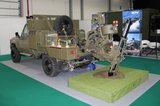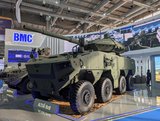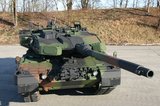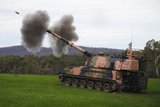Technodinamika eyes 80mm MLRS
Will an 80mm system join larger-calibre MLRS platforms such as the BM-27 Uragan, pictured here? (Photo: Russian MoD)
Rostec subsidiary Technodinamika expects to start serial production of a new 80mm multiple launch rocket system (MLRS) in 2024, a senior company official has told Russian state-run media.
‘We are proactively developing a demonstration model of a light 80mm calibre MLRS at our own expense,’ said Technodinamika CEO Igor Nasenkov.
He added: ‘If the results are positive, development can be completed in 2023 and after state tests, batch production can be mastered by the end of 2024.’
The MLRS (as yet unnamed) would use unguided 80mm missiles installed on standard Russian Ground Forces vehicles.
A demonstration model of the new system will be displayed in August at the Army 2021 exhibition near Moscow. Data from Shephard Defence Insight shows that the Russian MLRS arsenal is based on 122mm, 220mm and 300mm calibre systems — so an 80mm MLRS would offer a new element.
More from Land Warfare
-
![World Defense Show 2026: Large vehicles and counter-drone systems take the limelight]()
World Defense Show 2026: Large vehicles and counter-drone systems take the limelight
Visitors who attended the first World Defense Show four years ago continue to speak of the difficulties they faced with poor facilities and power problems. This year’s event emphasised its status as one of the major defence expositions and as a place where regional players and those less welcome at other shows could take centre stage.
-
![MKJ Warrior Series — The Nett Warrior Qualified Connector for Today’s Soldier Systems]()
MKJ Warrior Series — The Nett Warrior Qualified Connector for Today’s Soldier Systems
ITT Cannon’s MKJ Warrior connectors are designed for the harshest environments, delivering mission critical comms, navigation and USB data/power.
-
![Active vehicle protection comes to the forefront as Trophy and Iron Fist secure contracts]()
Active vehicle protection comes to the forefront as Trophy and Iron Fist secure contracts
Experience on the battlefield is accelerating the adoption of active protection systems as technologies continue to evolve to reflect shifting global defence needs.
-
![World Defense Show 2026: Hanwha increases Middle East presence and reveals Tigon 6x6 sale]()
World Defense Show 2026: Hanwha increases Middle East presence and reveals Tigon 6x6 sale
Shephard sat down with Hanwha Middle East and Africa president Sung Il at World Defense Show 2026 to hear about the company’s plans for the region and how it plans to use local industry success to win deals.
























